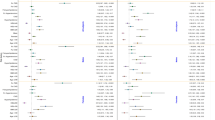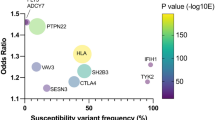Abstract
Due to absence of clinical manifestations of hormonal hyper secretion, the treatment of Nonfunctioning pituitary adenoma (NFPA) was always delayed. PTTG1 was reported to be overexpressed in most of pituitary tumors, however, the polymorphism of PTTG1 rs1895320, rs2910200 and rs6882742 with NFPA were still not fully elucidated in NFPA. Thus, a hospital based case control study which included 79 patients and 142 healthy control participants were conducted. DNA was extracted from peripheral blood samples and genotyped by Mass Array methods. In addition, a meta-analysis of rs2910200 was also employed to further testify the conclusion. Significant difference were observed between patients and healthy controls under rs2910200 locus between allelic genotype (p = 0.0219). However, no other significant difference was observed in rs1895329 and rs6882742. In addition, a logistic regression analysis showed that the dominant model of rs2910200 were closely correlated with the NFPA susceptibility (OR = 1.951, 95% CI:1.075–3.542, p = 0.028). While no significant difference was observed in the rs1895320 and rs6882742 under dominant model, recessive model and additive model The meta-analysis results showed that the dominant model and heterozygote model can significantly increase the risk of PA (p = 0.007, OR = 1.57, 95% CI:1.14–2.18; p = 0.009, OR = 1.57, 95% CI:1.12–2.19). Whereas no significant difference were observed under the homozygous model and recessive model. In conclusion, the polymorphism of PTTG1 rs2910200 dominant model and T allelic might increase the risk of NFPA.

Similar content being viewed by others
References
Chanson P, Raverot G, Castinetti F, Cortet-Rudelli C, Galland F, Salenave S (2015) Management of clinically non-functioning pituitary adenoma. Ann Endocrinol (Paris) 76:239–247. https://doi.org/10.1016/j.ando.2015.04.002
Chen S, Xiao L, Liu Z, Liu J, Liu Y (2011) Pituitary tumor transforming gene-1 haplotypes and risk of pituitary adenoma: a case-control study. Bmc Med Genet 12:44. https://doi.org/10.1186/1471-2350-12-44
Delgado-Lopez PD, Pi-Barrio J, Duenas-Polo MT, Pascual-Llorente M, Gordon-Bolanos MC (2018) Recurrent non-functioning pituitary adenomas: a review on the new pathological classification, management guidelines and treatment options. Clin Transl Oncol 20:1233–1245. https://doi.org/10.1007/s12094-018-1868-6
Kim DS, Franklyn JA, Stratford AL, Boelaert K, Watkinson JC, Eggo MC, McCabe CJ (2006) Pituitary tumor-transforming gene regulates multiple downstream angiogenic genes in thyroid cancer. J Clin Endocrinol Metab 91:1119–1128. https://doi.org/10.1210/jc.2005-1826
Liu W, Zahr RS, McCartney S, Cetas JS, Dogan A, Fleseriu M (2018) Clinical outcomes in male patients with lactotroph adenomas who required pituitary surgery: a retrospective single center study. Pituitary 21:454–462. https://doi.org/10.1007/s11102-018-0898-y
Ntali G, Wass JA (2018) Epidemiology, clinical presentation and diagnosis of non-functioning pituitary adenomas. Pituitary 21:111–118. https://doi.org/10.1007/s11102-018-0869-3
Pei L, Melmed S (1997) Isolation and characterization of a pituitary tumor-transforming gene (PTTG). Mol Endocrinol 11:433–441. https://doi.org/10.1210/mend.11.4.9911
Ramaswamy S, Ross KN, Lander ES, Golub TR (2003) A molecular signature of metastasis in primary solid tumors. Nat Genet 33:49–54. https://doi.org/10.1038/ng1060
Ren Q, Jin B (2017) The clinical value and biological function of PTTG1 in colorectal cancer. Biomed Pharmacother 89:108–115. https://doi.org/10.1016/j.biopha.2017.01.115
Romero AM, Whitsett TG, Aronova A, Henderson SA, LoBello J, Habra MA et al (2018) Protein expression of PTTG1 as a diagnostic biomarker in adrenocortical carcinoma. Ann Surg Oncol 25:801–807. https://doi.org/10.1245/s10434-017-6297-1
Tampourlou M, Fountas A, Ntali G, Karavitaki N (2018) Mortality in patients with non-functioning pituitary adenoma. Pituitary 21:203–207. https://doi.org/10.1007/s11102-018-0863-9
Tong Y, Eigler T (2009) Transcriptional targets for pituitary tumor-transforming gene-1. J Mol Endocrinol 43:179–185. https://doi.org/10.1677/JME-08-0176
Vlotides G, Eigler T, Melmed S (2007) Pituitary tumor-transforming gene: physiology and implications for tumorigenesis. Endocr Rev 28:165–186. https://doi.org/10.1210/er.2006-0042
Wildemberg LE, Glezer A, Bronstein MD, Gadelha MR (2018) Apoplexy in nonfunctioning pituitary adenomas. Pituitary 21:138–144. https://doi.org/10.1007/s11102-018-0870-x
Xu MD, Dong L, Qi P, Weng WW, Shen XH, Ni SJ, Huang D, Tan C, Sheng WQ, Zhou XY, du X (2016) Pituitary tumor-transforming gene-1 serves as an independent prognostic biomarker for gastric cancer. Gastric Cancer 19:107–115. https://doi.org/10.1007/s10120-015-0459-2
Xu X, Cao L, Zhang Y, Yin Y, Hu X, Cui Y (2018) Network analysis of DEGs and verification experiments reveal the notable roles of PTTG1 and MMP9 in lung cancer. Oncol Lett 15:257–263. https://doi.org/10.3892/ol.2017.7329
Yagnik G, Jahangiri A, Chen R, Wagner JR, Aghi MK (2017) Role of a p53 polymorphism in the development of nonfunctional pituitary adenomas. Mol Cell Endocrinol 446:81–90. https://doi.org/10.1016/j.mce.2017.02.017
Ye Z, Li Z, Wang Y, Mao Y, Shen M, Zhang Q.et al (2015) Common variants at 10p12.31, 10q21.1 and 13q12.13 are associated with sporadic pituitary adenoma. Nat Genet 47:793–797. https://doi.org/10.1038/ng.3322
Yeganeh PN, Richardson C, Bahrani-Mostafavi Z, Tait DL, Mostafavi MT (2017) Dysregulation of AKT3 along with a small panel of mRNAs stratifies high-grade serous ovarian cancer from both normal epithelia and benign tumor tissues. Genes Cancer 8:784–798. https://doi.org/10.18632/genesandcancer.164
Zhang X, Horwitz GA, Heaney AP, Nakashima M, Prezant TR, Bronstein MD, Melmed S (1999) Pituitary tumor transforming gene (PTTG) expression in pituitary adenomas. J Clin Endocrinol Metab 84:761–767. https://doi.org/10.1210/jcem.84.2.5432
Zlatkute E, Liutkeviciene R, Vilkeviciute A, Glebauskiene B, Kriauciuniene L, Jakstiene S.et al (2017) The role of MMP-1 and FGFR4-R388 gene polymorphisms in pituitary adenoma. Acta Med Litu ‘:177–190. https://doi.org/10.6001/actamedica.v24i4.3613
Acknowledgements
China Postdoctoral Science Foundation (grant number: 2017 M620700) Beijing Municipal Administration of Hospitals’ Youth Program (grant number: QML20170703); The Fundamental Research Funds for the Central Universities-Beijing University of Chinese Medicine Youth Teachers Program (grant number: 2018-JYBZZ-JS006); Nature Science Foundation of Capital Medical University(grant number: PYZ2017115).
Author information
Authors and Affiliations
Corresponding author
Ethics declarations
Conflict of interest
The authors declare no competing interests.
Additional information
Publisher’s Note
Springer Nature remains neutral with regard to jurisdictional claims in published maps and institutional affiliations.
Rights and permissions
About this article
Cite this article
Zhu, B., Gao, M., Zhang, L. et al. Association of PTTG1 polymorphism rs1895320, rs2910200 and rs6882742 with non-functioning pituitary adenomas in Chinese Han population: a case-control study. Metab Brain Dis 34, 841–846 (2019). https://doi.org/10.1007/s11011-018-0364-6
Received:
Accepted:
Published:
Issue Date:
DOI: https://doi.org/10.1007/s11011-018-0364-6




